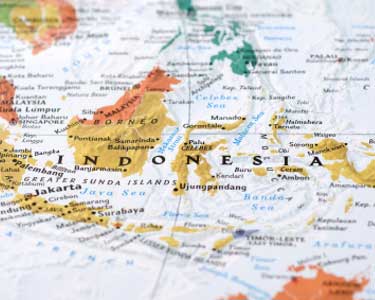Muslim Groups Demand Closure of Large, Legal Church
 Hundreds of Muslims from outside the area where a 600-member church meets in West Java, Indonesia, staged a protest there to call for its closure this month in an attempt to portray local opposition.
Hundreds of Muslims from outside the area where a 600-member church meets in West Java, Indonesia, staged a protest there to call for its closure this month in an attempt to portray local opposition.
Demonstrators from 16 Islamic organizations, including the hard-line Islamic Defenders Front (FPI), gathered on Feb. 15 to demand a stop to all activities by the Galilea Protestant Church (GPIB) in the Galaxy area of Bekasi City.
The Rev. M. Tetelepta, pastor of the church, told Compass that the church has had the required consent of local residents and official permission to worship since its inception in 1992.
“From the beginning we had permission to worship from both the government and the nearby residents,” Tetelepta said. “We worked on the building permit and had received principle clearance from the mayor of Bekasi. We had also received permission from the Bekasi Interfaith Harmony Forum.”
At the Galaxy area demonstration, FPI Bekasi branch head Murhali Baeda tried to impugn the legal status of the Galilea church by telling ANTARA, the official news agency of the Indonesian government, that he was “certain” that “a number of the church buildings” in the area “do not have complete permission.”
“This is proved by the large number of posters and banners that are displayed in the alleys and public gathering places rejecting the presence of these [church] buildings,” Murhali told ANTARA.
A Joint Ministerial Decree promulgated in 1969 and revised in 2006 requires the permission of more than 60 neighbors and a permit from local authorities to establish a place of worship in Indonesia.
Representatives of Islamic organizations at the demonstration shouted, “Churches are not allowed in Galaxy” and carried posters and banners declaring, “We Faithful Muslims Reject the Presence of Churches,” as well as “Beware of Christianization of Galaxy.”
Local organizations represented at the demonstration included the Bekasi Dakwah Council, the Bina An Nisa Dakwah Council of Bekasi and the Galaxy Mosque and Mushola Forum, but Tetelepta said he was sure that 95 percent of the protestors were not local people.
Also present at the demonstration were representatives of the Islamic Youth and Student Forum, Islamic Unity, the Committee to Enact Syariah (Law), Muhammadiyah, the Islamic Youth Movement, the Syariah Concern Society, the Islamic Youth Federation, the Bungin Dakwah Council, the Gembong River Society, Irene Centre and the Indonesian Mujahadin Council.
Baeda of the FPI accused the church of “Christianizing” local residents by distributing food “and the nine essentials at a reduced price.”
“The church is distributing these things as incentive to confess Jesus as their Lord,” Baeda told Compass. “We have received several reports of this from people who have accepted these distributions.”
This type of activity disturbs society, he added. “I consider this wrong-doing.”
The local FPI leader told ANTARA that there are at least six churches and a number of homes that function as churches.
“At night praises to their God in the form of songs disturbs the people’s sleep,” he reportedly said.
Tetelepta denied that the church had tried to “Christianize” people.
“We have never distributed food or the nine essentials,” he said. “The only thing we have done is to spray for mosquitoes near the church.”
Before coming to Galaxy the congregation had worshipped in various places in Bekasi. At the suggestion of the government, Tetelepta said, the church purchased the property in Galaxy in 2006 in order to construct a worship place.
He added that there has been an effort to discredit the church in the Bekasi area.
“Our worship services will continue as usual in spite of the demonstrations,” he said. “We are coordinating things with the police.”














































